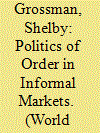| Srl | Item |
| 1 |
ID:
171446


|
|
|
|
|
| Summary/Abstract |
Property rights are important for economic exchange, but in many parts of the world, they are not publicly guaranteed. Private market associations can fill this gap by providing an institutional structure to enforce agreements, but with this power comes the ability to extort from group members. Under what circumstances do private associations provide a stable environment for economic activity? The author uses survey data collected from 1,179 randomly sampled traders across 199 markets in Lagos, Nigeria, and finds that markets maintain institutions to support trade not in the absence of government, but rather in response to active government interference. The author argues that associations develop protrade policies when threatened by politicians they perceive to be predatory and when the organizations can respond with threats of their own. The latter is easier when traders are not competing with one another. To maintain this balance of power, an association will not extort; it needs trader support to maintain the credibility of its threats to mobilize against predatory politicians.
|
|
|
|
|
|
|
|
|
|
|
|
|
|
|
|
| 2 |
ID:
171124


|
|
|
|
|
| Summary/Abstract |
Cross-border trade is central to the socio-economic structure of the former Soviet republics and their integration in the world economy. In the Caucasus and Central Asia, bazaars have functioned as nodes that enable multi-directional, cross-border trade. While there have been studies on the bazaar trade in the Soviet successor states, few have used quantitative methods. Drawing from 600 structured interviews with traders in Dordoi (Bishkek) and Lilo (Tbilisi), the data from Dordoi highlight the relationship between informality and entrepreneurship, unlike Lilo, where there are clearer markers of formality, but where bazaar trade also seems to be less profitable. The data from the 600 interviews illustrate that Dordoi functions as a globalized trading hub, its transnational linkages forged by the bazaar traders and the buyers themselves. By contrast, trade in Lilo is more localized. Hence, ‘globalization from below’ presents itself differently across the post-Soviet space.
|
|
|
|
|
|
|
|
|
|
|
|
|
|
|
|